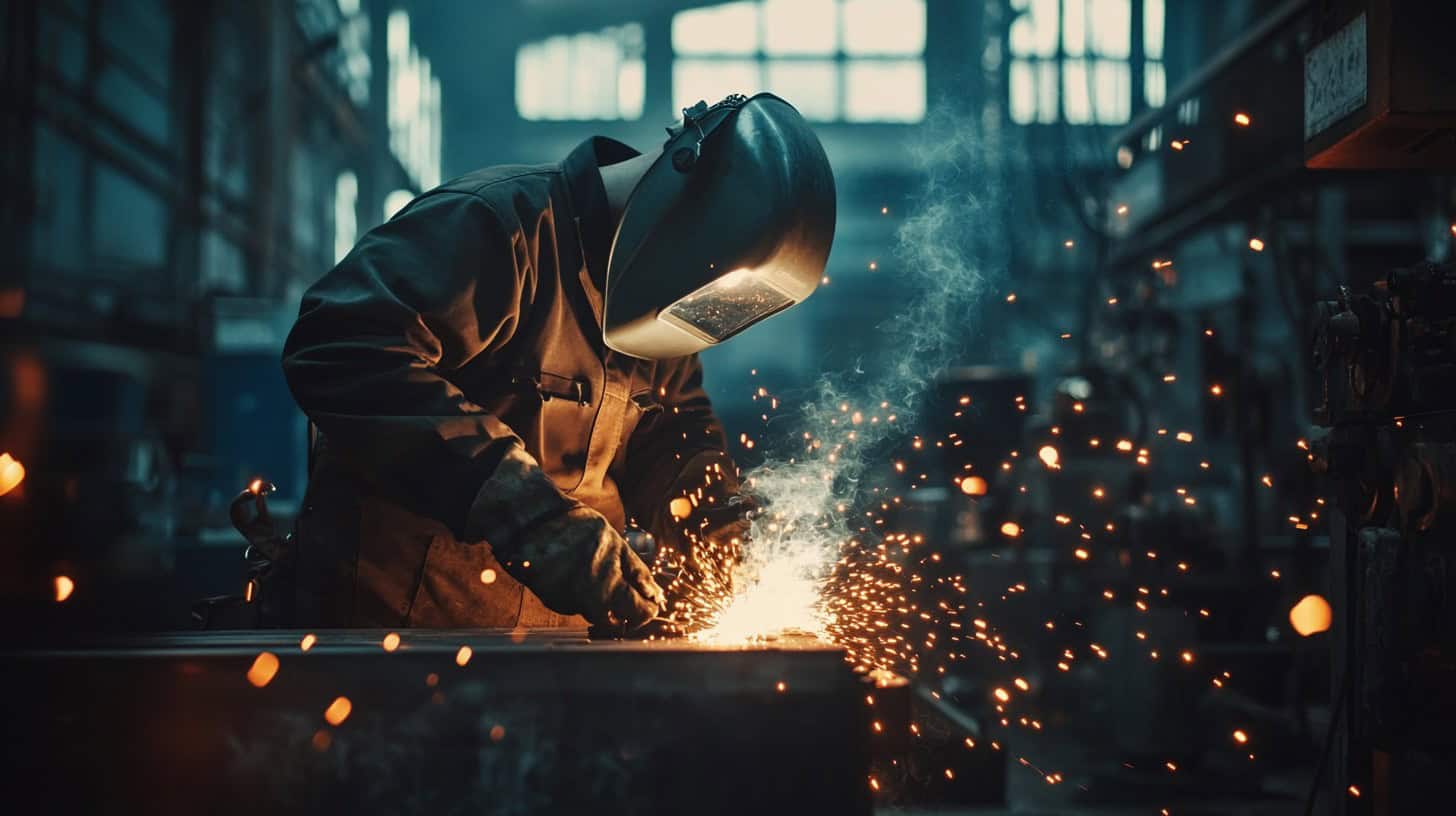Ever dreamed of fusing metal and sparks into a career? Welding might be your calling. It’s a hands-on job that’s crucial in many industries. 1 This guide will light your path to becoming a welder in 7 easy steps.
Ready to heat things up? Let’s go!
Key Takeaways
Welders earn a median pay of $48,940 per year or $23.53 per hour as of 2023, with top earners making over $63,660 annually.
To become a welder, you need a high school diploma or GED, vocational training, hands-on experience, and certification from the American Welding Society.
The Bureau of Labor Statistics predicts over 42,000 welding job openings each year until 2032, with a 1% job growth adding 6,200 new jobs by 2032.
Texas employs the most welders in the U.S. with 52,820 welders as of 2023, while Alaska offers the highest average salary at $77,100 per year.
Welding specializations include MIG, TIG, stick, pipe, underwater, aerospace, and robotic welding, with advanced certifications available to boost career prospects.
Table of Contents
Roles and Responsibilities of a Welder

Welders do more than just melt metal. They’re the unsung heroes who build our world – from skyscrapers to ships, and everything in between. Their job isn’t just about wielding a torch; it’s about reading blueprints, picking the right tools, and making sure every joint is strong enough to last.
Daily Tasks of a Welder
Welding isn’t just about zapping metal together. It’s a mix of art and science. A typical day starts with gearing up in protective clothing. Safety first, folks! Then it’s time to dive into blueprints.
These aren’t your grandma’s cookie recipes – they’re detailed plans for the day’s work. 1
Next comes the fun part: firing up the equipment and getting to work. You’ll cut, shape, and join metals like a pro. But it’s not all sparks and flames. Welders also inspect their work and maintain their tools.
It’s a hands-on job that keeps you on your toes. Speaking of which, let’s talk about the different types of welding jobs out there. 2
Welding is the glue that holds our metal world together. – Anonymous
Various Welding Job Types
Welding offers a wide range of job types. Let’s explore some popular welding careers:
- Structural Steel Welders: These pros join metal parts for buildings and bridges. They often work high up and need a steady hand.
- Pipeline Welders: These welders fix and build pipes for oil, gas, and water. They might travel a lot and work in tough spots. 4
- Shipyard Welders: They build and fix ships and boats. This job needs skill with different metals and welding types.
- Military Support Welders: These welders help fix tanks, ships, and planes for the armed forces. They may work in war zones or on bases.
- Underwater Welders: These brave folks weld under the sea. They fix oil rigs, ships, and dams while diving.
- Oil Rig Welders: They work on offshore rigs, fixing pipes and structures. It’s a tough job with long hours but good pay.
- Manufacturing Welders: These welders make cars, planes, and other goods in factories. They often use robots and high-tech tools.
- Auto Body Welders: They fix cars after crashes. This job needs skill in shaping metal and matching paint. 3
- Sheet Metal Workers: These pros make and fix metal products. They might work on HVAC systems or roofs.
- Industrial Panel Tank Welders: They build and fix big tanks for factories. This job often includes tank inspections too.
Each type of welding job has its own perks and challenges. Next, let’s look at how to start your welding career.
Educational Pathways for Aspiring Welders

Want to spark a career in welding? You’ve got options! From trade schools to apprenticeships, there’s a path for every future welder out there.
Requirements for a High School Diploma or GED
To become a welder, you’ll need a high school diploma or GED. It’s the bare minimum to get your foot in the door. Math and science classes are key – they’ll give you a solid base for the job.
Think algebra, geometry, and physics. These subjects help you understand the nuts and bolts of welding. 5
Shop class is a goldmine too. It lets you get hands-on with tools and materials. You’ll learn safety basics and how to read blueprints. Some schools even offer welding courses. If yours does, jump on it! It’s a great way to see if welding’s your thing before diving in headfirst.
Give me six hours to chop down a tree and I will spend the first four sharpening the axe. – Abraham Lincoln
This quote rings true for welding prep. The more you sharpen your skills in high school, the better off you’ll be. 6
Benefits of Vocational School Training
Vocational schools are great for welding training. They offer hands-on practice with real tools and machines. You’ll learn to weld like a pro in just 6 months to 2 years – way faster than a four-year degree! 5 Plus, these schools often have connections to local businesses, which can lead to great job offers before you even graduate.
My time at vocational school was fantastic. We got to try out different welding types – MIG, TIG, even some industrial panel tank welding. It was awesome! 7 The instructors had years of real-world experience and taught us tricks of the trade you can’t learn from books.
Vocational training is a smart choice for people looking to start one of the best careers in welding. It’s practical, quick, and gets you job-ready fast.
Steps to Achieve Certification in Welding
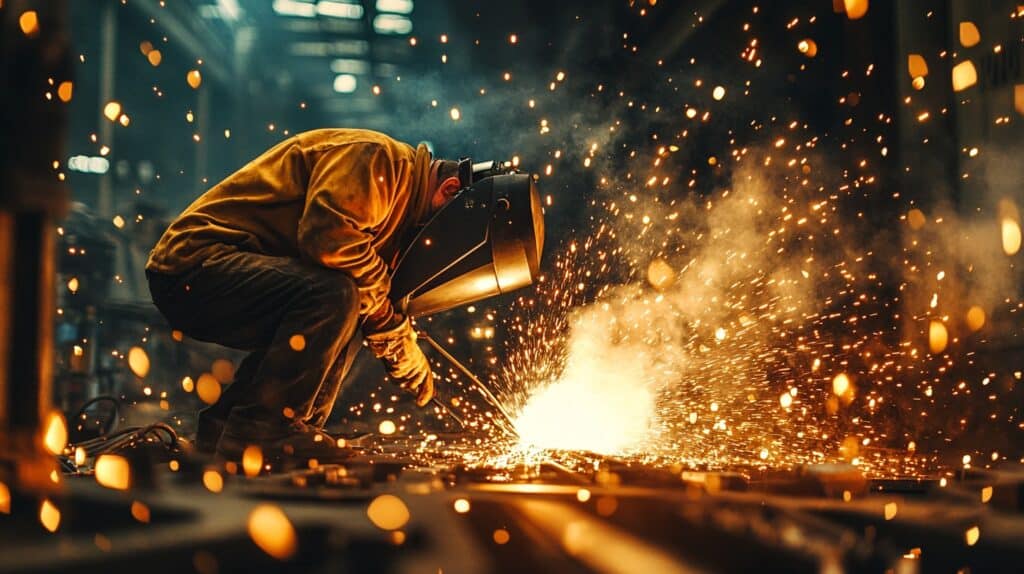
Welding certification isn’t just about sparks and metal. It’s a journey that’ll test your skills and grit. Ready to heat things up? Let’s dive into the steps you’ll need to take.
Completing Your High School Education
Finishing high school is a big deal for future welders. It’s the first step to an exciting career! Most welding jobs need at least a high school diploma or GED. 5 Math and science classes are super helpful.
They teach you stuff you’ll use every day on the job. 8 Mechanical drawing is another great class to take. It helps you read blueprints later.
High school isn’t just about grades. It’s about building the skills you need to succeed.
I think back to my high school days. Algebra seemed pointless then. But now, I use those math skills all the time in welding. It’s funny how things work out. So, stick with it! Your diploma is your ticket to a bright future in welding.
Enrolling in Vocational School
Ready to spark your welding career? Vocational school is your ticket. These programs pack a punch, teaching you the nuts and bolts of welding in just 6 months to 2 years. 5 You’ll get hands-on practice with tools like arc welders and angle grinders.
Plus, you’ll learn safety rules to keep you from getting burned on the job.
But it’s not all about the heat. Vocational schools also teach you how to read blueprints and do some basic math. This combo of skills makes you hot property for employers. Many schools even help you find a job after you finish. 6 So, if you’re itching to start melting metal, a vocational program might be your best bet.
Acquiring Hands-on Experience
Hands-on experience is key to becoming a top-notch welder. You can’t just read about it – you gotta do it! Many welding programs offer practice time with real tools. 9 But that’s just the start.
To really hone your skills, look for internships or apprenticeships. These gigs let you work alongside pros and learn the tricks of the trade. 6
Entry-level welding jobs are another great way to get your feet wet. You’ll tackle real projects and face actual job challenges. Plus, you’ll build a solid work history. This experience is gold when you’re ready to move up the ladder.
Next up: let’s talk about nailing that welding certification!
Securing a Welding Certification
After gaining hands-on experience, it’s time to get certified. The AWS Certified Welder program is open to anyone with welding skills. No fancy classes needed beforehand! You’ll show off your welding chops at an AWS Accredited Testing Facility.
These spots are all over the world, so you’re likely to find one nearby. 10
The test is all about doing, not talking. You’ll weld real pieces together – no multiple-choice questions here! It’s like a practical exam for your hands. The testers want to see if you can make the welds they ask for.
If you pass, you’ll get a shiny new certification. This proves you’ve got the skills employers want. It’s your ticket to better jobs and maybe even higher pay. So, roll up your sleeves and get ready to spark up that welding torch! 6
Opportunities in Welding Specializations and Advanced Certifications
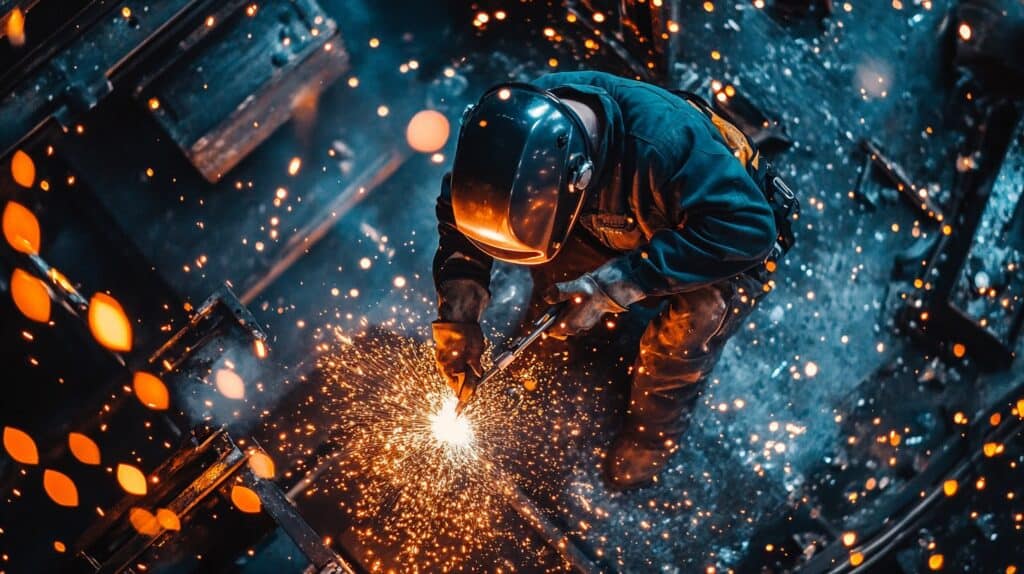
Welding offers a hot career path with many sparks! From underwater jobs to pipe welding, you can pick your niche. Want to learn more about welding specialties? Keep reading!
Selecting a Welding Specialization
Welding offers a range of specialties to suit different interests and skills. Let’s explore some popular welding specializations you might consider.
- MIG Welding: This common method uses a wire electrode and shielding gas. It’s fast, clean, and great for thin metals.
- TIG Welding: Known for precision, TIG welding is ideal for detailed work. It’s often used in aerospace and automotive industries. 5
- Stick Welding: This versatile technique works well outdoors and on dirty or rusty metals. It’s a go-to for construction and repair jobs.
- Pipe Welding: Skilled pipe welders are in high demand. This specialty involves joining pipes for oil, gas, and water systems.
- Underwater Welding: For the adventurous, this high-paying specialty combines diving and welding skills. It’s used in offshore oil rigs and ship repairs. 8
- Aerospace Welding: This field requires top-notch precision. You’ll work on aircraft parts and spacecraft components.
- Robotic Welding: As automation grows, so does the need for welders who can program and operate welding robots.
- Structural Welding: This specialty focuses on large-scale projects like bridges and buildings. It’s crucial for safety in construction.
Choosing a specialty can boost your job prospects and earning power. Next, let’s look at how to earn advanced certifications in your chosen field.
Earning Advanced Welding Certifications
Once you’ve picked your welding niche, it’s time to level up. Advanced certifications can boost your career and earning potential. Here’s how to snag those top-tier welding creds:
- Get experience: Log several years of welding work. This hands-on time is crucial.
- Hit the books: Take extra classes on welding tech and safety. Many schools offer these courses. 11
- Pick your cert: Choose from options like Certified Welding Inspector or Certified Welding Educator.
- Study hard: Prep for tough exams. They test both practical skills and book smarts.
- Take the test: Pass written and practical exams. These show you know your stuff inside and out. 12
- Keep learning: Stay up-to-date on new welding methods. The field always changes.
- Network: Join groups like the American Welding Society. They offer resources and job leads.
- Specialize further: Consider niche certs in areas like underwater or aerospace welding.
- Teach others: Some certs let you train new welders. It’s a great way to give back.
- Renew regularly: Most certs need updating every few years. Stay on top of this to keep your edge.
Analyzing the Welder Job Market
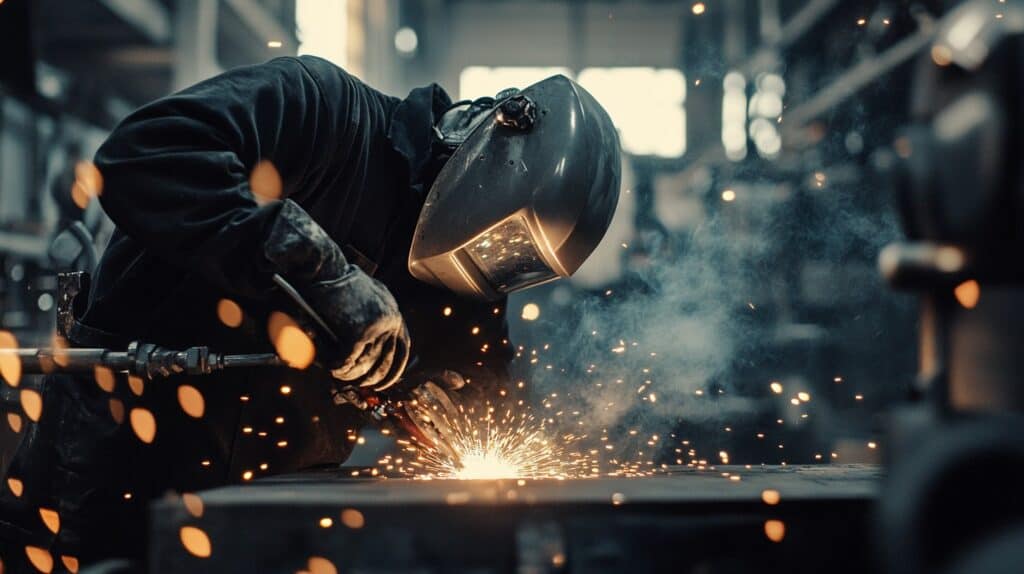
Welders can rake in some serious dough – and the job market’s heating up! Want to know more about salaries and where the hottest welding gigs are? Keep reading…
Insights into Average Salaries for Welders
Let’s talk cash, fellas. Welding isn’t just about sparks and metal – it’s about putting bread on the table. And boy, does it deliver!
| Welding Pay Breakdown | Annual Salary | Hourly Rate |
|---|---|---|
| Average Pay | $47,010 | $22.60 |
| Median Pay (2023) | $48,940 | $23.53 |
| Top Earners | $63,660+ | $30.60+ |
These numbers aren’t just smoke and mirrors. They’re from the Bureau of Labor Statistics – the big guns for job data. 13 The average Joe Welder pulls in a cool $47k a year. Not too shabby, right? 14 But check this out: the median pay in 2023 hit nearly $49k. That’s a nice bump! And if you’re really bringing the heat? Top welders are raking in over $63k annually. That’s some serious cheddar for making things stick together. So, if you’ve got steady hands and don’t mind a little heat, welding might just be your ticket to a fatter wallet.
Trends and Outlook for Welding Jobs
Welding jobs are hot right now! The Bureau of Labor Statistics sees steady growth ahead. They predict over 42,000 job openings each year until 2032. 13 That’s a lot of sparks flying! Industrial panel tank welding is booming too.
I’ve seen firsthand how these skills are in high demand.
Job security in welding looks solid. By 2032, there’ll be over 437,000 welders in the U.S. That’s a 1% jump from 2022. It means 6,200 new jobs! Welders who keep up with new tech will have the best shot.
Employers want folks who can handle different welding types. So, learning gas metal arc welding or tungsten inert gas welding could pay off big time. 15
Regions with High Demand for Welders
Welders are in high demand across the U.S. Some regions offer more jobs and better pay than others. Here’s a look at the hottest spots for welders:
- Alaska: The Last Frontier tops the list with an average salary of $77,100. It’s a welder’s paradise with plenty of oil and gas projects.
- Hawaii: Island life isn’t just about beaches. Welders here earn an average of $76,540. Shipyards and construction keep welders busy.
- District of Columbia: The nation’s capital offers welders an average salary of $65,020. Government projects and infrastructure work abound.
- Texas: Everything’s bigger in Texas, including the job market for welders. With 52,820 welders, it’s the top employer in the country. 16
- Utah: This state shows the fastest job growth for welders at 30.5%. Construction and manufacturing sectors are booming.
- Idaho: Close behind Utah, Idaho boasts a 28% job growth rate. The tech industry’s expansion has sparked a need for skilled welders.
- Arizona: With a 26.4% growth rate, the Grand Canyon State offers plenty of opportunities. Solar energy projects are driving demand. 13
Now, let’s spark some interest in the educational paths to becoming a welder.
Becoming a Welder in Specific States (Example: Texas)
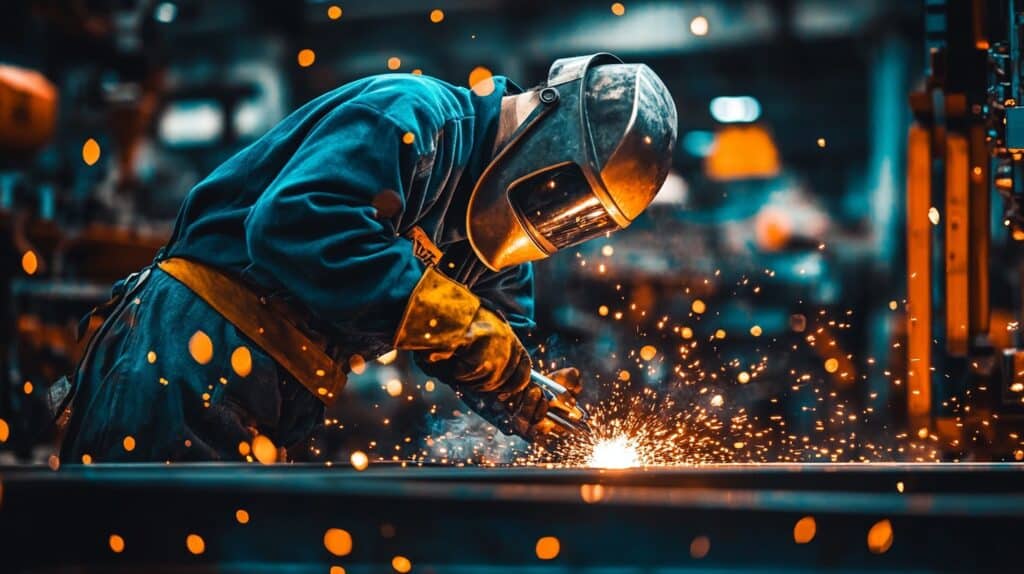
Howdy, y’all! Texas is a hot spot for welders – and I’m not just talkin’ about the weather. The Lone Star State’s got its own set of rules and regs for folks lookin’ to spark up a career in welding.
State-specific Educational Requirements
Texas has its own rules for welders. You’ll need to finish a welding program to work there. These programs teach you the basics and safety stuff. They cover different types of welding, like MIG and TIG.
Some schools offer quick certificates, while others have longer degree options. 17
The American Welding Society (AWS) cert can boost your job chances. It’s not a must, but it shows you know your stuff. Many Texas employers look for this when hiring. Plus, it can lead to better pay and more interesting projects.
If you’re serious about welding in Texas, consider getting certified. 18
Local Welding Educational Facilities
Texas boasts top-notch welding schools. UTI’s Welding Technology program shines in Austin, Dallas/Fort Worth, and Houston. Students can finish in just 36 weeks – that’s less than nine months! 18 These schools offer hands-on training with real welding gear.
You’ll learn from pros who know the trade inside out. Plus, you’ll get to practice on the same tools you’ll use on the job.
Local community colleges also offer solid welding programs. They often team up with nearby businesses to give students real-world experience. 17 Some even have job placement services to help grads find work fast.
Don’t forget about trade schools – they’re another great option for aspiring welders. These schools focus on practical skills you’ll use every day on the job.
Job Opportunities and Market Outlook in Texas
After learning about local welding schools, let’s spark up some talk about jobs in Texas. The Lone Star State is red-hot for welders right now. It’s got more welders than any other state – a whopping 52,820 as of 2023. 19 That’s a lot of folks melting metal!
Texas needs welders bad. Old bridges and buildings need fixing. New stuff needs building. 17 It’s one of the coolest jobs out there, especially if you’re into industrial panel tank welding.
The pay’s not too shabby either. Plus, with all the rebuilding going on, welders are in high demand. It’s a great time to strike while the iron’s hot and start a welding career in Texas.
People Also Ask
What’s the first step to becoming a welder?
Start by getting your hands dirty with basic welding techniques. You can dive into on-the-job training or enroll in certificate programs at junior colleges. It’s like learning to brew beer – you gotta start somewhere!
Do I need a fancy degree to weld?
Nope! While some folks go for associate’s or bachelor’s degrees, many welders kick off their careers with vocational training. It’s more about skill than sheepskin. Think of it like becoming a realtor – you need know-how, not a Ph.D.
What kinds of welding should I learn?
There’s a buffet of welding types to choose from! Gas metal arc welding (GMAW), shielded metal arc welding (SMAW), and tungsten inert gas (TIG) welding are popular picks. It’s like having different beers on tap – variety is the spice of life!
How important is safety in welding?
Safety is the name of the game in welding. You’ll need to master safety procedures and gear up with protective equipment. It’s like being a DIY enthusiast – you wouldn’t use power tools without goggles, right?
Can I specialize in a specific type of welding?
Absolutely! You could become an expert in underwater welding or focus on aerospace. It’s like being a craft brewer – you might make IPAs or stouts. Find your niche and run with it!
How’s the job market for welders?
According to the Bureau of Labor Statistics, welding jobs are hot! With good pay and steady demand, it’s a solid career choice. Plus, you can work in various industries, from construction to manufacturing. It’s like having a Swiss Army knife of skills!
References
^ https://ca.indeed.com/career-advice/finding-a-job/what-does-a-welder-do (2024-04-26)
^ https://www.careervillage.org/questions/652003/what-does-a-day-look-like-for-a-welder (2023-01-24)
^ https://www.indeed.com/career-advice/finding-a-job/types-of-welding-jobs (2024-04-18)
^ https://www.twi-global.com/technical-knowledge/faqs/types-of-welding-jobs
^ https://www.amtec.us.com/blog/how-to-become-a-welder-a-step-by-step-guide
^ https://www.indeed.com/career-advice/career-development/how-to-become-a-welder (2024-04-30)
^ https://www.ncstrades.edu/blog/7-reasons-why-become-a-welder/
^ https://www.degreechoices.com/careers/how-to-become-a-welder/
^ https://www.employbridge.com/position-spotlight/how-to-become-a-welder
^ https://www.aws.org/Certification-and-Education/Professional-Certification/Certified-Welder-Program/
^ https://ptt.edu/advancement-opportunities-in-the-welding-field/
^ https://www.careervillage.org/questions/780992/how-do-i-make-a-career-in-welding-without-going-beforehand-mean-high-school-tech-or-advanced-work-could-i-get-a-bachelors-degree-for-welding (2023-09-17)
^ https://www.bls.gov/ooh/production/welders-cutters-solderers-and-brazers.htm
^ https://www.thefabricator.com/thefabricator/article/arcwelding/how-much-do-welders-make-the-truth-on-welder-salary
^ https://andersondahlen.com/welding-jobs-outlook/
^ https://yeswelder.com/blogs/yeswelder/is-welding-a-high-demand-job?srsltid=AfmBOoqNZu1tgTpNVTbzwjRazc8_SiBbGIeDNp0GIMWlx5RZ9GZ0cGQU
^ https://dreambound.com/blog/how-to-become-a-welder-in-texas
^ https://www.uti.edu/blog/welding/becoming-a-welder-in-texas (2023-03-20)
^ https://news.twc.texas.gov/work-texas/news/welding-job-market-texas (2014-10-31)
